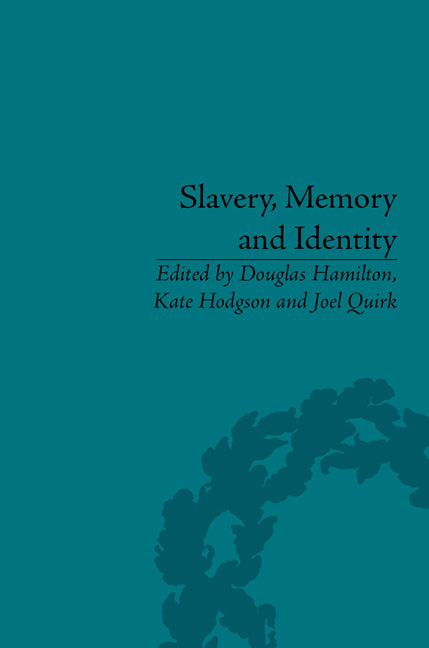Book contents
- Frontmatter
- CONTENTS
- Acknowledgements
- List of Contributors
- Introduction: Slavery, Memory and Identity: National Representations and Global Legacies
- 1 ‘A Thoroughly National Work’: The Politics of Blame and European Abolitionist Identities
- 2 From Slave Quarters to Wigwams: Native American Slaveholding and the Debate over Civilization
- 3 For Civilization's Sake: Legal Abolition of Slavery in Nepal and Sierra Leone in a Global Perspective, 1920–30
- 4 The Heritage of Slavery and Nation Building: A Comparison of South Africa and Mauritius
- 5 Picturing Slavery: The Perils and Promise of Representations of Slavery in the United States, the Bahamas and England
- 6 ‘History Must be Re-Written!’: Revisionist Ambitions among West African Slave Descendants
- 7 Contrapuntal Memories of Slavery and Abolition in the French-Speaking World
- 8 Public Memory of Slavery in Brazil
- 9 Learning to Remember and Imagine Slavery: The Pedagogies of Museum Field Trips in the Representation of ‘Difficult’ Histories
- 10 Slavery and Racism as the ‘Wrongs’ of (European) History: Reflections from a Study on Portuguese Textbooks
- Notes
- Index
1 - ‘A Thoroughly National Work’: The Politics of Blame and European Abolitionist Identities
- Frontmatter
- CONTENTS
- Acknowledgements
- List of Contributors
- Introduction: Slavery, Memory and Identity: National Representations and Global Legacies
- 1 ‘A Thoroughly National Work’: The Politics of Blame and European Abolitionist Identities
- 2 From Slave Quarters to Wigwams: Native American Slaveholding and the Debate over Civilization
- 3 For Civilization's Sake: Legal Abolition of Slavery in Nepal and Sierra Leone in a Global Perspective, 1920–30
- 4 The Heritage of Slavery and Nation Building: A Comparison of South Africa and Mauritius
- 5 Picturing Slavery: The Perils and Promise of Representations of Slavery in the United States, the Bahamas and England
- 6 ‘History Must be Re-Written!’: Revisionist Ambitions among West African Slave Descendants
- 7 Contrapuntal Memories of Slavery and Abolition in the French-Speaking World
- 8 Public Memory of Slavery in Brazil
- 9 Learning to Remember and Imagine Slavery: The Pedagogies of Museum Field Trips in the Representation of ‘Difficult’ Histories
- 10 Slavery and Racism as the ‘Wrongs’ of (European) History: Reflections from a Study on Portuguese Textbooks
- Notes
- Index
Summary
In a speech to Parliament in 1815, the British foreign secretary, Lord Castlereagh, cautioned the powerful British abolitionist movement that they were in danger of alienating the rest of Europe. He asked that they ‘refrain from reviling the Governments of those countries from arriving quickly at the termination of a traffick which we, with our nicer moral feeling upon it, had not accomplished until the lapse of many years’. In the interest of keeping the peace in Europe, openly vilifying other nations for their slave-trading activities was thus discouraged. Castlereagh's speech also tackled broader assumptions of British moral superiority and ‘civilization’. After the abolition of the slave trade in 1807, British campaigns against the slave trade increasingly found a new focus overseas and the identification of the foreign ‘Other’ as slave trader was a vital stage in the construction of national identities around the issue of abolition. Castlereagh's remark regarding Britain's recently-acquired ‘nicer moral feeling’ on the issue of slave trading implicitly criticized self-aggrandizing responses to the abolition of the slave trade, as well as the associated accusations of immorality levelled at other countries. However, the warning was ignored and the politics of blame became an increasingly widespread aspect of international abolitionist campaigns, making a significant contribution to British campaigns against the continued European slave trade after 1807.
This chapter looks at processes of nation-building in the nineteenth century around the issue of abolition, both positively, through a sense of morally-justified national pride and achievement, and negatively, through blame, vilification and moral shaming. It examines how ‘notorious’ slave-trading nations such as France, Spain and Portugal came to be constructed from the outside (particularly, but not solely, from a British standpoint) and portrayed as ‘immoral’ or ‘uncivilized’. It then takes a parallel view of the reception of these externally-imposed judgements on slave-trading activity and colonial policy, examining how abolitionists in those countries singled out for criticism reconciled this reputation as ‘immoral’ slave traders with their own abolitionist convictions.
- Type
- Chapter
- Information
- Slavery, Memory and IdentityNational Representations and Global Legacies, pp. 15 - 28Publisher: Pickering & ChattoFirst published in: 2014



